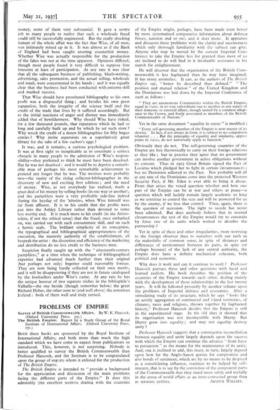PROBLEMS OF EMPIRE
Survey of British Commonwealth Affairs. By W. K. Hancock. (Oxford University Press. 25s.) The British Empire. Report by a Study Group of the Royal Institute of International Affairs. (Oxford University Press. i5s.)
Boni these books are sponsored by the Royal Institute of International Affairs, and both more than reach the high standard which we have come to expect from publications so introduced. This, however, is not surprising. Nobody is better qualified to survey the British Commonwealth than Professor Hancock, and the Institute is to be congratulated upon the group of experts whom it enlisted for the production of The British Empire.
The British Empire is intended to " provide a background for the appreciation and discussion of the main problems facing the different parts of the Empire." It does this admirably (the excellent sections dealing with the countries of the Empire might, perhaps, have been made even better by more systematised comparative information about defence forces, taxation and so on), and it does more. It appraises and discusses those problems with the clarity and succinctness which only thorough familiarity with the subject can give. Anyone who may be moved by the current Imperial Con- ference to take the Empire less for granted than most of us are inclined to do will find in it invaluable assistance in his search for enlightenment.
He will discover that the organisation of the British Com- monwealth is less haphazard than he may have imagined. It has many anomalies. It can, as the authors of The British Empire say, " better be described than defined." " The position and mutual relation " of the United Kingdom and
the Dominions was laid down by the Imperial Conference of 1926 as follows : " They are autonomous Communities within the British Empire, equal in status, in no way subordinate one to another in any aspect of their domestic or external affairs, though united by a common allegi- anCe to the Crown, and freely associated as members of the British Commonwealth of Nations."
Yet in the same document " equality in status " is modified :
" Every self-governing member of the Empire is now master of its destiny. In fact, if not always in form, it is subject to no compulsion whatever . . . But the principles of equality and similarity, appro- priate to status, do not universally apply to function."
Obviously they do not. The self-governing countries of the Empire are free theoretically to carry on their foreign relations as they like ; but in practice they agree that no government can involve another government in active obligations without its consent. Thus in 1925 Great Britain signed the Pact of Locarno which pledged her to fight in certain 'circumstances ; but no Dominion adhered to the Pact. Nor probably will all at any rate of the Dominions come into the projected Western Security Pact, if Mr. Eden is ever able to bring it about. From that arises the vexed question whether and how one part of the Empire can be at war and others at peace—a question which will luckily remain largely academic so long as we continue to control the seas and will be answered for us by the enemy, if we lose that control. Then, again, there is the question of secession. The right to secede has never been admitted. But does anybody believe that in normal circumstances the rest of the Empire would try to constrain by force one of its units which wished to dissolve the partnership ?
Yet in spite of these and other irregularities, more worrying to the foreign observer than to ourselves with our faith in the makeshifts of common sense, in spite of distances and differences of environment between its parts, in spite (or perhaps because) of the lack of any central authority, the Empire does have a definite mechanical cohesion, both political and economic.
Why does it work and can it continue to work ? Professor Hancock pursues these and other questions with lucid and learned realism. His book describes the position of the countries of the Empire towards each other, dealing mainly with the development of those relationships in the last twenty years. It will be followed presently by another volume upon the problems of Imperial defence and economics. After a stimulating study of its structure, which he says " looks like an untidy aggregation of continental and island territories, of climates, races and religions, thrown together by haphazard history," Professor Hancock decides that the Empire is still in the experimental stage. In the old days it showed that its organisation was not incompatible with liberty. But liberty grew into equality ; and may not equality destroy Unity ?
Professor Hancock suggests that a constructive reconciliation between equality and unity largely depends upon the success with which the Empire can continue the advance " from force to persuasion " as the means for the maintenance of its unity. And, one is inclined to add, this must, in turn, largely depend upon how far the Anglo-Saxon genius for compromise and also bonds of sentiment, which are by no means to be despised as a consolidating influence, continue to be helped by self- interest, that is to say by the conviction of the component parts of the Commonwealth that they stand more safely and usefully in the arena of world affairs as an inter-connected group than














































 Previous page
Previous page